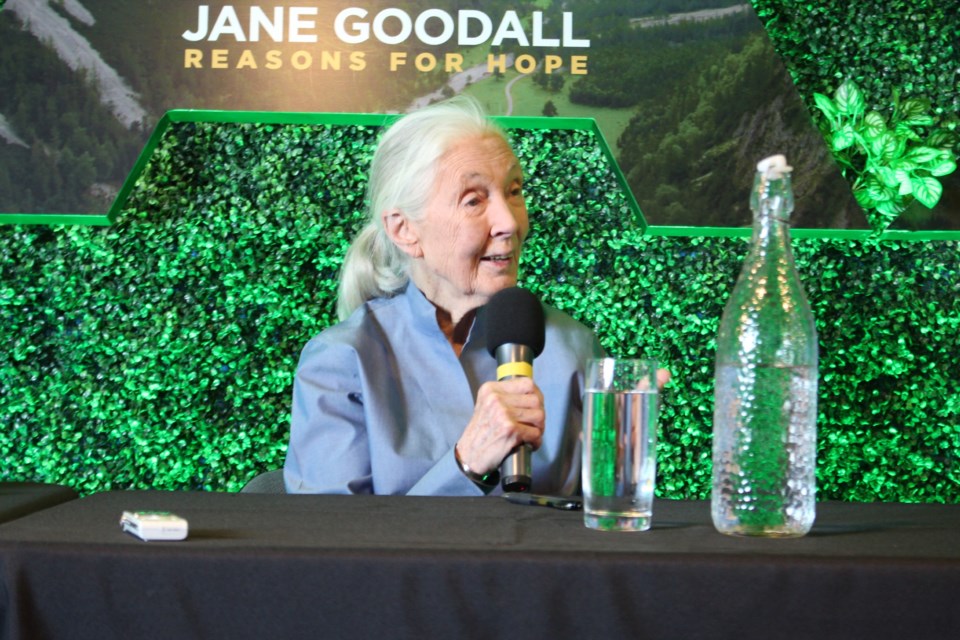World-famous environmentalist Jane Goodall was in Sudbury May 30 for the launch of the IMAX film “Jane Goodall - Reasons for Hope” by local producer David Lickley.
The film takes audiences on a global journey to showcase good news stories that reinforce Goodall's four pillars of hope: the resilience of nature, the power of youth, the indomitable human spirit, and the amazing human intellect.
Greater Sudbury’s regreening following mining pollution damage is held up in the film as a reason for hope along with the migration of the northern bald ibis over the Alps and the re-introduction of the American bison to the Blackfeet Nation in Montana.
Sudbury.com attended the film screening at Science North and the press conference afterward in which area youth and local media were invited to ask Goodall questions.
Answering a question from a youth about why hope is important, Goodall said without hope, we become apathetic and do nothing.
She said she hoped the film gave the youth the feeling that nothing is impossible if we work together.
“Without hope that won't happen, and this film is about inspiring people with hope,” Goodall said. “We can, we will, we must.”
If we don’t, well, “we’re doomed,” she said, adding “we humans are not exempt from the extinction of species.”
Sudbury.com asked Goodall how people can continue to hope when there are setbacks in environmental efforts around the world.
We gave the local example of the cutting of many environmental programs at Laurentian University in 2021 due to LU’s insolvency. Laurentian has been one of the driving forces behind Greater Sudbury’s regreening for half a century, and senior LU scientists Peter Beckett and John Gunn are featured alongside Goodall in the film.
The 89-year-old Goodall, who became known worldwide for her chimpanzee research in Gombe Stream National Park in Tanzania in the 1960s, said she’s had many setbacks over the years.
She recalled when funding was withdrawn from the Gombe research project after four of her students were kidnapped in 1975.
Goodall said she “girded my loins and got out the begging bowl” and travelled the United States, and tried to convince donors “that just because of the kidnapping, that didn’t mean the end of everything.”
She said her local staff in Tanzania carried on with the research at that time without pay.
“Finally, it got enough support to keep going,” Goodall said. “That was one setback. They’re happening all the time. So you get past setbacks by girding your loins, and by saying we will, together, overcome.”
Following Goodall’s comments, John Gunn, Canada Research Chair in Stressed Aquatic Systems, who works out of the Vale Living with Lakes Centre, gave a few reasons for hope of his own.
He said Jackie Litzgus, director of the Vale Living with Lakes Centre, has just been named the inaugural recipient of the Dr. Jane Goodall Research Fellowship in Conservation Biology at Laurentian.
Gunn said 1,800 graduates are also going to be walking across the stage at Laurentian’s convocation this week, wearing the “green leaf of hope pin,” inspired by Goodall’s work.
“And on my desk is a one-page description of the new environmental program called Environmental Solutions that is being put in front of the strategic plan as we speak,” Gunn said. “So thank you, Jane.”
Lickley, the film’s producer, said he had previously worked with Goodall for his 2002 film “Jane Goodall’s Wild Chimpanzees.” The film “Jane Goodall - Reasons for Hope” is his seventh giant-screen film.
He said he had kept in touch with Goodall over the years, as her focus had shifted from solely chimpanzees to environmental efforts around the world.
“And as I started reading these books, I thought, you know, there’s a sequel that we can do that doesn’t involve just chimps,” Lickley said. “So I went to her 2010, and I said, I've been reading your books, Jane, what do you think about doing a sequel, but we'll do it about hope? And we'll do it not just about chimps, but about other things.”
He said Sudbury’s regreening is something Goodall speaks about all over the world, and now it will be featured in an IMAX film that’s seen worldwide.
“That story of Sudbury is going to be told, and people are going to go ‘Oh, isn’t that amazing,’” Lickley said. “Hopefully they’ll say ‘Maybe we need to do it here too’.”
He said the biggest challenge in putting this film together was COVID.
“We got the funding secured the month before the world shut down,” Lickley said.
Goodall went to live at her sister’s home in England for her safety, and she and the crew couldn’t travel until COVID restrictions started to lift around the world in 2021.
Even when they began to film in Montana, one of the crew members tested positive for COVID, so that film shoot ended up being delayed for months.
The film will be available for public viewing at Science North beginning June 3, and will be offered at various IMAX and giant screen theatres across North America and beyond.
Heidi Ulrichsen is a reporter at Sudbury.com.
